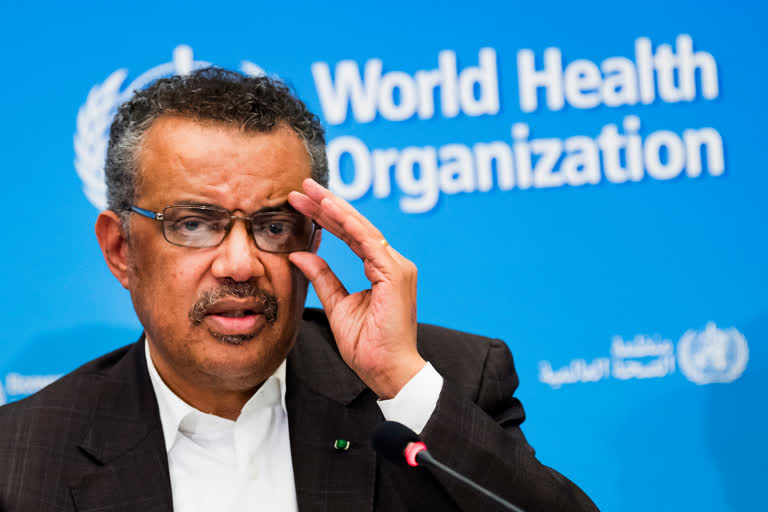Geneva:China is mostly likely to be on the spot as the World Health Organization has started its first-ever virtual assembly due to coronavirus pandemic.
Trump has targetted the Chinese lab in Wuhan and blamed China for not acting quickly to inform the world of exactly what was happening in the initial phase of coronavirus outbreak.
An exclusive interview with Akhil Parashar, senior journalist, Beijing on 'China vs World' over coronavirus outbreak in WHO 73rd Assembly. While the US halted its contributions to the World Health Organization accusing it of parroting Beijing, Australia’s foreign minister on Monday welcomed international support for an independent investigation of the coronavirus pandemic, a proposed inquiry that has been condemned by China and blamed for a bilateral trade rift.
Read |India among 62-nation seeking probe into WHO's COVID-19 response
The European Union and other countries on Monday called for an independent evaluation of the World Health Organization's response to the coronavirus pandemic to review the experience gained and lessons learned.
The resolution has the support of more than 120 out of a total of 190 member states of WHO and will be discussed this week at the decision-making body of the UN health agency, being held virtually this year.
The proposal is intended to initiate a stepwise process of an impartial, independent and comprehensive evaluation of WHO's efforts to coordinate the international response to COVID-19, including the functioning of international health law and its actions within the greater UN health system.
Australian Foreign Minister Marise Payne said her government had been keen to ensure that the resolution stipulates the inquiry be impartial, independent and comprehensive.
“We’re very encouraged by the growing levels of support for this comprehensive World Health Assembly motion,” Payne told reporters. “We look forward to seeing hopefully a positive outcome later this week.”
However, representatives of the UN's 194 member states will gather for the WHO 73rd Assembly devoted almost entirely to strengthen global coordination against the pandemic.
Read |No approved treatments yet for COVID-19: WHO
The assembly will last two days and will be held in a virtual format due to restrictions in place to curb the spread of the virus which originated in the Chinese city of Wuhan last December.
The annual meeting comes at a time when WHO has attracted unprecedented global attention for its coordinating and advisory role during the pandemic which has infected a total of 47,13,620 people globally and killed 3,15,185 others.
But the organization has not escaped criticism nor controversy during its handling of the crisis, with the bulk of accusations of mismanagement coming from the US government, but also Australia and Germany.
WHO Director-General Tedros Adhanom Ghebreyesus has weathered much of the criticism and has been accused by US President Donald Trump of being biased towards Chinese information in the first weeks of the outbreak at the beginning of the year.
Ghebreyesus famously said that China had set a new standard for outbreak control and that the country's actions had bought the world time.
Besides, Taiwan will not press for participation at the World Health Assembly beginning, but will continue to donate medical supplies abroad and protest China's two-faced behavior that excludes it from such forums, the island's foreign minister said.
Joseph Wu told the shortened agenda for this year's WHA requires time to be devoted to concentrating on ways to control the coronavirus pandemic. Taiwan agreed with suggestions that the issue of its participation be discussed instead at meetings later this year once the outbreak had been better contained, Wu said.
“After careful deliberation, we have accepted the suggestion from our allies and like-minded nations to wait until the resumed session before further promoting our bid," Wu said.
Taiwan's United Nations seat was handed to China in 1971 and Beijing insists the self-governing island republic it claims as its territory has no right to diplomatic relations or membership in U.N. bodies. Taiwan had been an observer at the WHA in past years when its relations with China were warmer, but China has taken a hard line since the 2016 election of independence-leaning Taiwanese President Tsai Ing-wen. Taiwan insists China has never been authorized to represent it.
Wu said his ministry expressed deep regret and strong dissatisfaction that the World Health Organization Secretariat has yielded to pressure from the Chinese government and continues to disregard the right to health of the 23 million people of Taiwan.
Despite its exclusion from the WHO, Taiwan is working closely with the United States and many European countries to develop rapid testing kits, vaccines and medicines for COVID-19 and has donated 27.5 million face masks, 131 infrared thermal imaging cameras, 35,000 thermometers and 250 automatic body temperature detection systems to foreign countries, Wu said.
Plans call for the donation of another 23.5 million surgical masks, 1.16 million N95 masks, 1,70,000 protective gowns, 6,00,000 isolation gowns, 70 respirators, 34 PCR test devices and 5,00,000 quinine tablets, Wu said.
(AP/IANS/PTI)
